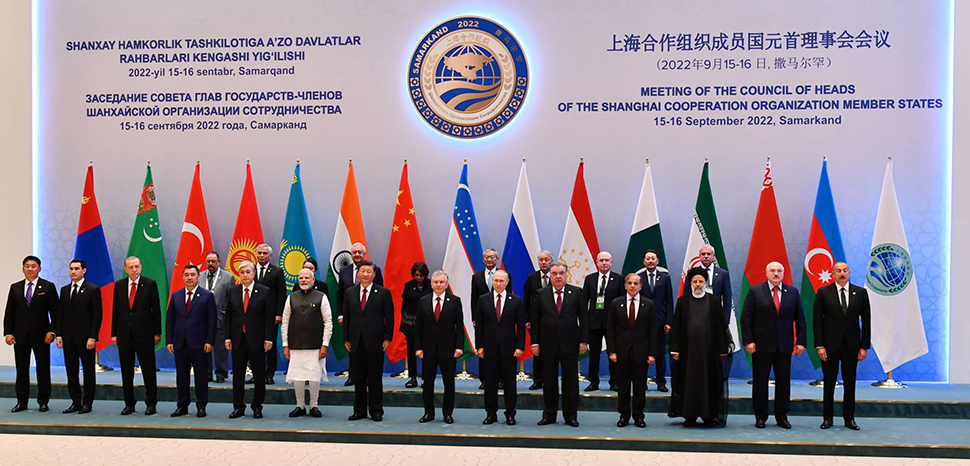Amid the Ukraine war and tense relations between Russia and Kazakhstan, the strategic importance of Uzbekistan in Central Asia is increasing for China. Uzbekistan’s relative stability and stable relations with both regional and global actors create an opportunity for China to diversify its relations and pursue a more balanced approach to Central Asia. Tashkent is a key player for Beijing, not only in terms of bilateral relations but also because of its regional importance, which fits with China’s Central Asia strategy. During the recent SCO summit, new agreements between China and Uzbekistan show the increasing importance of Uzbekistan in Central Asia.
In terms of bilateral relations, China ranks second as the biggest trade partner for Uzbekistan. Trade with China accounted for 17-20% of country’s total trade, with bilateral trade volume was reaching $7.4 billion in 2021. After Russia, China is Uzbekistan’s second largest export market. In the January-July 2022 period, its exports to China were worth $1.5 billion. China’s trade with Uzbekistan increased 32.5% from January to July 2022 compared to the same period in 2021.
China already plans to increase trade volume with Uzbekistan, with a goal of reaching $10 billion. Two important factors can increase trade turnover in the future. For one, Uzbekistan has the largest population in Central Asia, and the increasing prosperity of the Uzbek population leads to greater consumption and greater demand for foreign goods. In this context, Chinese companies that increase their presence in the Uzbek market may foster stronger commercial relations between the two countries. Second, compared to other Central Asian countries, Uzbekistan’s economy is relatively diverse. In the future, Tashkent may not only exports raw materials, but also develop new opportunities to export industrial products to China and contribute to the overall trade volume.
In addition to trade, investments from China to Uzbekistan are also increasing. Three different factors are encouraging China to invest in Uzbekistan. First, regional development, especially strained relations between Russia and Kazakhstan, and growing uncertainty may force Chinese companies to diversify their investments in the region to reduce dependence on Kazakhstan.
Second has to do with the liberalization of some of Tashkent’s state-owned enterprises, creating new opportunities for Chinese companies to invest and strengthen their market position. In addition, Uzbekistan’s recent trade agreements with the EU and the UK attract the attention of Chinese companies, because companies have the chance to export thousands of products duty-free to EU and UK.
Finally, public opinion about China is also important factor that may determine future Chinese investment to Uzbekistan. What do Uzbek people think of China’s approach to their home countries? The Central Asia Barometer (CAB) Survey is a biannual large-scale research project that measures social, economic, and political atmospheres in Central Asian nations. According to the Central Asian Barometer Survey Wave 10, conducted in 2021, public opinion regarding China and Chinese investments in Uzbekistan is more positive than in other countries.
According to the Central Asia Barometer Survey Wave 10 question “How much confidence do you have that China’s investment in our country will create jobs in our country for our citizens?”, 70% of the participants from Uzbekistan answered that they have great or some confidence about China’s investment. Elsewhere, 27% of the participants from Kazakhstan answered the same way, while 70% said they have not very much confidence or none at all regarding Chinese investment.
These three factors could encourage China to invest in Uzbekistan and help reduce its vulnerability to both external shocks and anti-Chinese sentiment. We already see a growing Chinese presence in Uzbekistan. The decision of Chinese BYD to cooperate with UzAuto for the production of electric cars in Uzbekistan and the decision to start the assembly of Chinese Chery cars in Uzbekistan shows that the interest of Chinese companies in Uzbekistan is increasing. During the SCO summit, Uzbekistan signed $15 billion worth of agreements with China covering trade, investment, financial, and technical cooperation. The new agreements not only show Chinese companies’ interest in Uzbekistan, but also demonstrate Beijing’s growing interest at the state level.
In addition to growing bilateral relations, Uzbekistan’s strategic importance is growing at the regional stage for China. Uzbekistan’s connectivity strategy and its policy toward Shanghai Cooperation Organization (SCO) overlap with China’s foreign policy strategy in Central Asia. In terms of connectivity, Uzbekistan’s proactive policy to promote to construction China-Kyrgyzstan-Uzbekistan (CKU) railway and its effort to realize the Trans-Afghan railway project overlap China’s connectivity strategy in Central Asia.
Tashkent transportation diplomacy has two main important implications for China. First, new routes through Uzbekistan create new alternatives for China-EU railway trade and help Chinese companies to reduce their dependence on Russian and Kazakhstani territory. Second, Uzbekistan’s policy toward Afghanistan overlaps China’s policy for integrating Afghanistan into Central Asian countries’ economies and strengthening connectivity between China and Afghanistan through regional players.
Finally, the policy of Uzbekistan and China towards the SCO complements each other. Compared to Russia, both countries want to see the SCO as a regional economic organization rather than a security-oriented one because both have strong economic relations with Western countries. Tashkent’s proposal to create an SCO Mutual Investment Action Plan to balance external financial shocks and ensure uninterrupted investment flow, and the proposal for cooperation in the agricultural sector to reduce the vulnerability of member countries to agricultural product shortages and high prices are both in line with China’s SCO policy.
In summary, due to the Ukraine war and tense relations with Russia-Kazakhstan, the strategic importance of Uzbekistan to China is increasing at the bilateral and regional levels. Over the short-term, Uzbekistan’s proactive diplomacy toward its neighbors and global powers, and its privatization effort of state-owned companies, can draw the attention of Chinese entities to invest in the country and strengthen their market position. In the medium- to long-term, increasing connectivity between Uzbekistan and regional countries and more friendly public opinion about China’s investment can encourage China to further shift its investment strategy from Kazakhstan to Uzbekistan. China can also invest further in connective infrastructure and Uzbekistan’s industrial sector, which may lead to the creation of a second strategic hub in Central Asia similar to Kazakhstan.
The views expressed in this article belong to the authors alone and do not necessarily reflect those of Geopoliticalmonitor.com




